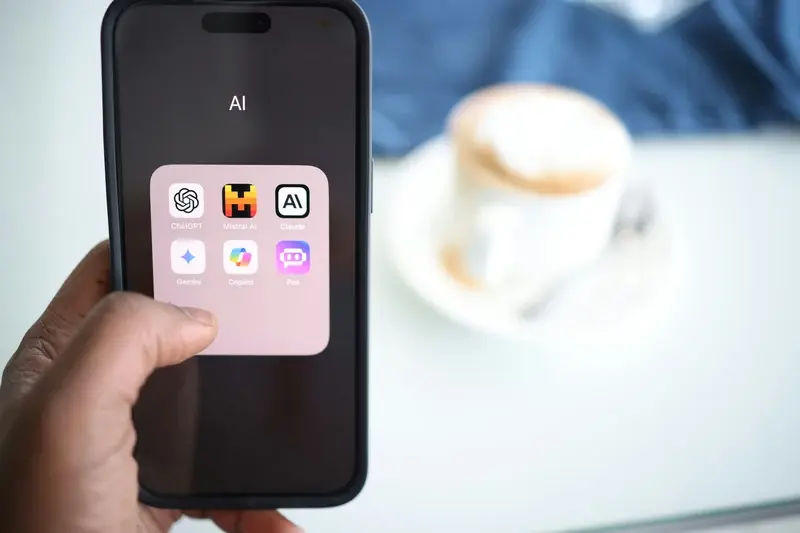Can I Build a Mobile App Using AI?
So, you're wondering if artificial intelligence (AI) can help you create a killer mobile app, right? With so much buzz about AI these days that it's hard to separate fact from fiction, with all these options, tools, and seemingly unlimited tech jargon, where do you even begin? Well, sit tight, because we're here to break it down for you. We're going to explain what AI can actually do for you and your app development journey.
Technology is a useful servant but a dangerous master.Christian Lous Lange
In this guide, we'll explore the benefits AI brings to the table, address some common myths, and give you a clear idea of how AI stacks up against traditional development. By the time you're finished reading, you'll feel confident in your ability to make informed decisions about using AI in your mobile app strategy. So, let's dive in, shall we?
The Dream vs. The Reality
Let's be honest – wouldn't it be brilliant if you could just type "Create me a mobile app that helps my customers schedule appointments and get automatic reminders" into a clever AI system, and poof – out pops a fully functioning, beautifully designed app ready for the App Store?
If you're nodding your head right now, you're not alone. Many business owners come to us with this hope, especially after reading about the latest developments in technology. And while we wish we could tell you it's that simple (it would make our jobs a lot easier too!), the reality is a bit more nuanced.
AI can indeed be an incredible ally in app development, but it's not a magic button you can press to instantly create the perfect mobile app. There are several steps involved, and getting it right takes more than just an interest in AI. It requires a clear strategy, a deep understanding of your business needs, and an alignment between your technology goals and your company's vision.
Imagine AI as a shiny new tool in your business toolkit. Sure, it's advanced and exciting, but just like any tool, it works best when you use it correctly. Otherwise, you might end up spending more time and resources than you initially planned for without reaping the desired benefits.
At Glance, we often see businesses eager to dive headfirst into the world of AI, driven by the fear of missing out and the allure of digital transformation. But the truth is, much like constructing a building, you need a solid foundation before adding the fancy features on top. Jumping in headfirst without a plan might lead to more headaches than breakthroughs.
Your journey with AI in mobile app development should start with identifying your goals. What do you want to achieve? Is it improved efficiency, better customer engagement, or a more personalised user experience? Once you know your destination, it becomes easier to map out the path.
The Current State of AI in App Development
Right now, AI is like having a really clever assistant who can help with various parts of app development – but it's not yet a complete replacement for human developers. Think of AI as a teammate with an extraordinary skill set that enhances but doesn't overshadow the talents of human developers. It's like trying to build a house; AI can be the power tools that speed up and improve precision, but you still need skilled builders to design and construct the walls. For businesses, this means you don't need to replace your entire team with robots. Phew, what a relief, right?
AI in mobile app development is here to make your life easier, not to take over. It automates mundane tasks, accelerates problem-solving, and brings forward innovative solutions that might have taken ages otherwise. Though AI is impressive, it still relies on the creativity, strategic thinking, and empathy that only humans can offer.
- AI enhances user interactions by personalising experiences and providing real-time feedback.
- AI integration can streamline operations, reducing time spent on repetitive tasks.
- AI enables advanced security features like facial recognition to boost app security.
- Through AI, mobile apps can offer automated translation services, making them accessible globally.
- AI-driven chatbots provide 24/7 customer support, improving user satisfaction and engagement.
- AI technology supports better decision-making through detailed data analysis and predictive insights.
- AI increases operational efficiency by speeding up data processing and automating routine decisions.
So while incorporating AI into your mobile app development can give your app an edge, remember that it's all about collaboration. AI takes care of the grunt work, leaving your star developers to focus on what they do best—creating extraordinary apps that resonate with users. Embracing this duo—not only cuts development time but can also lead to a product that wows your customers.
This collaborative approach leads to better apps with enhanced functionality, right from intuitive user interfaces to rock-solid security features. AI can do wonders, but let's not forget that it's not about making developers redundant; it's about elevating their game.
What AI Can Do Well
So, you're wondering if AI can help with building your mobile app? Let's put the spotlight on some key areas where AI really shines: code assistance and generation, design support, testing and quality assurance, and project planning.
Firstly, with code assistance and generation, AI is like your trusted co-pilot. It helps developers quickly write code by suggesting snippets or even generating code based on natural language prompts. This can drastically cut down development time and eliminate pesky human errors.
Moving on to design support, AI tools can offer design suggestions and create prototypes that align with the latest trends and user preferences. Imagine having a design buddy that's always on the cutting edge of what's cool and functional.
When it comes to testing and quality assurance, AI deserves a standing ovation. Automated testing powered by AI can sniff out bugs and performance issues more efficiently than manual testing, ensuring that your app is as robust and user-friendly as possible before it hits the market.
Finally, in project planning, AI tools can predict timelines, allocate resources, and even offer insights into potential project risks. It's like having a crystal ball that gives you a sneak peek into the future of your app development project.
By leveraging AI in these ways, you’re not just building an app; you're creating a streamlined, efficient development process that could lead to a superior end product. But remember, even AI has its limits, and a human touch is often necessary to guide the process to success.
What AI Still Struggles With
AI may seem like a whiz-kid on TV, rapidly solving the world's toughest puzzles, but when it comes to complex problem-solving in real-world app development, it's not quite that simple. While AI can help tackle straightforward tasks, it still struggles with multifaceted problems that require deep contextual understanding and creative thinking, elements that often require a human touch.
Moreover, when it comes to user experience design, AI stumbles. Good design is an art that requires empathy, creativity, and a human understanding of aesthetics and user behaviour. AI can certainly assist in the process, for instance, by analysing user data to offer insights, but it can't craft an engaging and intuitive interface that resonates with human emotions the way a skilled designer can.
In terms of system architecture, AI isn't yet sophisticated enough to build structures that support robust, scalable, and efficient apps. While it can suggest optimisations and perform code reviews, constructing a comprehensive system architecture requires an overarching view of both the immediate and long-term goals of the application, something that AI isn't fully equipped to handle autonomously.
Finally, the implementation of business logic is another area where AI falls short. Understanding complex business requirements, processing rules and translating them into the code that aligns with business goals is a nuanced task. AI lacks the ability to comprehend these intricate business details on its own. Human ingenuity and experience bring the necessary depth of understanding to efficiently implement business logic that realistically aligns with company objectives.
Common Misconceptions About AI App Development
Let's bust some myths, shall we?
Myth 1: "AI Will Replace All Developers"
AI is a tool, not a replacement. Think of it like power tools in construction – they make the job easier but don't replace skilled builders.While AI can streamline many tedious aspects of app development, like automating testing or analysing user data, it doesn't have the creative spark or problem-solving ability a human mind brings to the table. The subtle nuances of user experience, for instance, often require a human touch – a touch that AI, as of now, simply can't replicate.
Engaging your target audience and addressing their unique challenges often demands insights beyond the capabilities of artificial intelligence. AI might help you with the groundwork, but envisioning the broader picture, optimising the interface, or crafting a compelling story around your brand involves the kind of creativity that human developers specialise in.
So, while AI can be a phenomenal asset in your app development toolkit, it's like having a high-tech hammer. Both are crucial, but you wouldn’t build a house on your own with just a hammer, would you?
Myth 2: "AI-Built Apps Are Cheaper"
While AI can reduce some costs, the total investment often remains similar due to the need for human oversight, testing, and refinement.
As a business owner, you're likely aware that cutting costs isn't everything. It's about striking the right balance between cost efficiency and quality. After all, who wants to end up with a bargain-bin app that doesn't work as it should? Even when AI takes on certain development tasks, experienced human developers are crucial for reviewing, testing, and polishing the final product. This ensures the app aligns with your brand's standards and provides a seamless user experience.
Think of AI as a helpful assistant rather than the boss. It can streamline some of the monotonous processes, like automating repetitive tasks and sifting through large datasets. However, the human touch is needed to interpret complex nuances, make critical decisions, and deliver the creative flair that sets your app apart.
Myth 3: "AI Creates Perfect Code"
AI-generated code often needs significant human review and modification. It's more like a first draft than a final product. Even though AI may speed up parts of the coding process, it's not yet a one-size-fits-all solution. You'll often find that AI produces code that needs a discerning human touch to ensure it's up to snuff.
As business leaders, you know the importance of a high-quality app. In the end, your company’s reputation depends on it. While AI can provide some help, expert developers still need to step in to fine-tune and tailor the code to fit the unique needs of your app and its users. Think of AI as an enthusiastic apprentice; capable, but still learning the ropes.
Remember, while AI can handle quite a bit, it's the mix of solid human expertise and AI that creates apps that truly stand out. Real app magic still requires that touch of human creativity and understanding. AI is an assistant, not an auteur.
Myth 4: "Anyone Can Build an App with AI"
Successfully using AI in app development still requires technical knowledge and understanding of software development principles. Sure, AI can perform magic tricks, but it's not a full-blown wizard yet. Even with AI, you'll still need the human touch – skilled developers who can interpret data, understand the programming languages, and strategically apply AI technology to address your specific business challenges.
Think of AI as your enthusiastic assistant, eagerly waiting to help out but still needing your direction. It's crucial for you and your team to have a grasp on AI's capabilities and limitations to effectively integrate it into your app.
Also, don't forget that AI isn't just about making an app smarter; it's about enhancing user experience, personalising services, and making data-driven decisions. So while AI can give your app a cool factor with some swanky features, remember that the ultimate goal is to meet your user's needs – and that's something only you, with your intrinsic business acumen, can fully appreciate and deliver.
Useful AI Tools For Your App Development Journey
When you're looking to excite customers with an app that shouts innovation there are plenty of AI tools out there to help. Let's take a quick jaunt through some of the most useful ones, shall we?
- GitHub Copilot: GitHub Copilot: It harnesses the power of AI to help you code faster and smarter. Trained on a massive dataset from public code repositories, it's designed to make suggestions, complete code snippets, and even generate full functions based on your comments and existing code.
- ChatGPT: ChatGPT is designed to assist and enhance creativity when you're stuck or need a fresh perspective. Use it to refine user dialogues, generate content, or help structure your app's user experience. Its strengths lie in text generation and language processing, which can be harnessed for various tasks within app development.
- TensorFlow: Google's brainchild—TensorFlow is perfect if you're looking to create machine learning models within your app. It's robust, flexible, and can handle complex data sets, which makes it a fan-favourite among developers.
- IBM Watson: Not just a wannabe sci-fi name, Watson is your go-to for a wide range of AI services, from natural language processing to sentiment analysis. Have some data insights you need? Watson's on it!
- Dialogflow: Engaging with users in a conversational manner is more important than ever. Dialogflow helps you build AI-powered chatbots with natural language understanding. Perfect for adding a human touch to your services.
- Azure Machine Learning Studio: Wishing to flex a bit of Microsoft muscle? Azure ML Studio offers a streamlined platform for deploying models without a degree in rocket science.
- H2O.ai: This open-source tool is like your tech Swiss army knife—great for predictive analytics. If you want to predict customer behaviours or trends, H2O.ai might just be your new best mate.
These tools are like the Swiss cheese of AI—the holes are opportunities to play and improve upon the cheddar that is your app. With these by your side, creating an app that stands out from the crowd isn’t just a pipe dream—it's well within reach. Ready to get cracking?
Conclusion
Can you build a mobile app using AI? Yes and no. You can certainly use AI to help build an app, but creating a successful, market-ready application still requires human expertise, especially for business-critical applications.
The good news? You don't have to choose between AI and human developers. The sweet spot lies in combining both – using AI to accelerate development and reduce costs where possible, while relying on human expertise for the complex, creative, and critical aspects of app development.
Ultimately, whether you're looking to enhance an existing app or embark on a new project, embracing AI can give your business the competitive edge it needs. What's next is up to you, but with the right support and a dash of curiosity, the possibilities are right at your fingertips. We're here to help you navigate this journey. Let's see what amazing things we can build together.
Share this
Subscribe To Our Learning Centre
You May Also Like
These Related Guides

What Are the Different Types of Mobile App?

How Can You Successfully Integrate AI into Your Mobile App?



